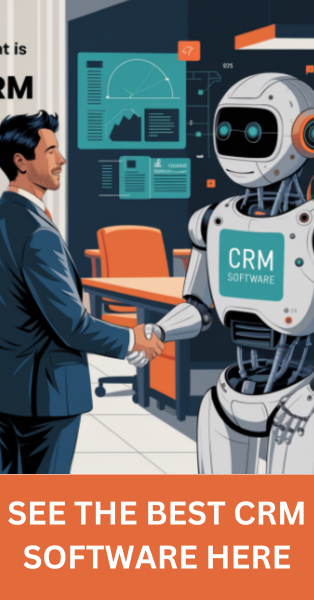CRM for business
Are You Worried About Losing Customers?
Have you ever wondered why some businesses seem to keep their customers no matter what? The secret isn’t just great products or services—it’s strong relationships.
Keeping customers happy and loyal is more important than ever in today’s competitive world. Without that connection, they can easily slip away to someone else.
That’s where Customer Relationship Management (CRM) comes in. It helps you better understand your customers, meet their needs, and keep them coming back.
Want to know how CRM can help your business grow? Let’s dive in.
What is CRM?
CRM, or Customer Relationship Management, refers to the strategies, technologies, and practices businesses use to manage and analyze customer interactions throughout the customer lifecycle.
The goal is to strengthen relationships, increase retention, and drive growth.
CRM has evolved significantly over the years, from simple contact management tools to powerful platforms that integrate sales, marketing, and customer service.
Modern CRM systems allow businesses to centralize their data, streamline operations, and provide personalized experiences.
How CRM Works
A CRM system acts as a hub for storing and managing customer data.
It encompasses various functionalities to simplify and optimize operations, from tracking leads to automating marketing campaigns.
Types of CRM Systems
1. Operational CRM
Operational CRM systems are focused on automating and streamlining business processes involving customer interactions. These systems help businesses manage their day-to-day sales, marketing, and customer service activities.
The goal is to improve efficiency, enhance customer satisfaction, and reduce costs by automating tasks such as lead management, marketing campaigns, and service requests.
Key Features of Operational CRM:
- Sales automation (tracking leads, opportunities, and deals)
- Marketing automation (email campaigns, social media management)
- Customer service automation (ticketing systems, helpdesk management)
- Contact management (tracking customer information and interaction history)
Best For: Businesses that need to automate their customer-facing processes and improve operational efficiency.
2. Analytical CRM
Analytical CRM systems focus on analyzing customer data to gain insights that can help businesses improve decision-making. These systems are designed to analyze customer behavior, sales trends, and other data to identify opportunities for improvement and growth. Analytical CRMs use data mining, machine learning, and reporting tools to generate valuable insights, such as customer preferences, lifetime value, and buying patterns.
Key Features of Analytical CRM:
- Customer data analysis and segmentation
- Predictive analytics (forecasting sales trends and customer behavior)
- Reporting and dashboard tools
- Integration with data warehouses and business intelligence tools
Best For: Businesses that want to leverage customer data to make data-driven decisions and create targeted marketing strategies.
3. Collaborative CRM
Collaborative CRM systems are designed to enhance communication and collaboration between different departments within a company. This type of CRM allows sales, marketing, customer service, and other teams to work together to provide a seamless customer experience. Collaborative CRMs facilitate information sharing and ensure that all departments have access to the same customer data, which can help improve response times, consistency, and overall customer satisfaction.
Key Features of Collaborative CRM:
- Shared access to customer data and communication history
- Collaboration tools for cross-functional teams
- Communication channels (email, chat, social media)
- Workflow management and task assignment
Best for: Businesses with multiple departments or teams must collaborate to deliver a unified customer experience.
4. Campaign Management CRM
Campaign management CRM systems focus on supporting and managing marketing campaigns. These systems provide tools for creating, executing, and analyzing marketing campaigns, helping businesses reach the right audience with targeted messaging.
They typically include features like segmentation, A/B testing, and performance tracking, which can help improve the effectiveness of marketing efforts.
Key Features of Campaign Management CRM:
- Campaign creation and automation tools
- Audience segmentation based on customer data
- A/B testing and performance tracking
- Integration with email and social media marketing platforms
Best For: Businesses focusing heavily on marketing must manage, optimize, and track their marketing campaigns.
5. Social CRM
Social CRM systems are designed to help businesses manage and engage with customers on social media platforms. These systems track customer interactions across Facebook, Twitter, LinkedIn, and Instagram.
Social CRM enables businesses to respond quickly to customer inquiries, monitor social media sentiment, and engage in conversations that can build stronger relationships with their audience.
Key Features of Social CRM:
- Social media monitoring and listening tools
- Integration with social media platforms (Facebook, Twitter, etc.)
- Sentiment analysis and tracking
- Social customer support and engagement features
Best For: Businesses prioritizing social media as a customer engagement and marketing channel.
Why is CRM Important for Your Business?
The benefits of CRM are vast and apply to businesses of all sizes. Let’s explore why it’s such a valuable asset:
- Enhancing Customer Relationships
CRM systems help you understand customer preferences, enabling personalized interactions that make clients feel valued. - Improving Customer Retention
Happy customers stay loyal. With CRM, you can identify pain points and address them proactively. - Streamlining Business Operations
CRM automates mundane tasks, freeing time for your team to focus on strategic initiatives. - Boosting Sales and Revenue
CRM helps you close deals faster and more efficiently by identifying high-value leads and tracking sales progress.
Benefits of CRM for Different Business Sizes
- Small Businesses: Gain access to enterprise-level tools for managing customer relationships on a budget.
- Medium-sized Enterprises: Streamline operations across teams and scale as the business grows.
- Large Organizations: Manage vast amounts of data and deliver consistent customer experiences across multiple channels.

Key Features of a Good CRM System
Investing in the right CRM system can make all the difference.
Not all CRMs are created equal, so it’s essential to identify key features that align with your business goals.
1. User-Friendly Interface
A CRM should simplify, not complicate. A clutter-free, intuitive interface ensures your team can quickly adapt and make the most out of the system.
2. Scalability
As your business grows, your CRM needs to grow with it. Look for systems that can handle increasing data, users, and functionality without requiring a complete overhaul.
3. Automation Features
From automating email campaigns to scheduling follow-ups, a CRM with robust automation capabilities saves time and reduces human error.
4. Data Analytics and Reporting
Comprehensive dashboards and reporting tools allow you to gain insights into customer behavior, sales trends, and overall business performance.
5. Customization Options
Every business is unique. The ability to customize fields, workflows, and integrations ensures the CRM aligns perfectly with your processes.
Choosing the Right CRM for Your Business
With so many CRM options available, selecting the right one can feel overwhelming. Here’s a step-by-step guide to simplify your decision-making process:
1. Assessing Business Needs
Identify what you need from a CRM. Is it better lead management, enhanced customer support, or streamlined marketing? Define your goals first.
2. Budget Considerations
CRMs come in various pricing tiers, from free startup plans to enterprise-level solutions.
Determine what fits within your budget without sacrificing essential features.
Implementing CRM in Your Business
Introducing a CRM system into your business requires careful planning and execution. Here’s how to ensure a smooth transition:
1. Planning and Goal Setting
Define what success looks like. Are you aiming for a 20% increase in customer retention? Setting measurable goals will guide your implementation process.
2. Employee Training and Buy-In
A CRM is only as effective as its users. Conduct thorough training sessions to ensure employees are comfortable with and understand the system’s value.
3. Data Migration and System Setup
Migrating existing data into the new system can be tricky. Clean up outdated or irrelevant information before transferring it to avoid clutter.
Measuring the Success of CRM Implementation
Once your CRM is up and running, how do you measure its success? Keep an eye on these metrics:
- Customer Satisfaction Metrics: Are your customers happier and more engaged?
- Sales Performance: Has the CRM contributed to shorter sales cycles or higher conversion rates?
- ROI Analysis: Compare the costs of implementing CRM with the financial benefits it generates.
Examples of CRM Success Stories
Many businesses have seen remarkable transformations thanks to CRM. Here are two real-world examples:
Case Study 1: Small Business Growth
A local bakery used a CRM to automate its customer loyalty program. The result? A 25% increase in repeat customers and a significant boost in revenue.
Case Study 2: Enterprise Efficiency
A multinational retailer implemented CRM to centralize customer data across global branches.
This improved customer support and helped identify purchasing trends across regions.
Common Mistakes to Avoid in CRM Usage
While CRM systems are powerful, misuse can lead to inefficiencies. Here are some common pitfalls to steer clear of:
1. Overcomplicating the System
Trying to implement every feature at once can overwhelm your team. Start with the basics and scale gradually.
2. Neglecting Data Quality
A CRM is only as good as its data. Regularly update and clean your database to ensure accuracy.
3. Lack of Employee Training
Skipping proper training can lead to underutilization of the system. Invest time in educating your team for maximum ROI.
Future Trends in CRM
CRM technology continues to evolve, incorporating cutting-edge innovations. Here are some trends shaping the future:
1. AI and Machine Learning Integration
AI-powered CRMs can analyze customer behavior, predict trends, and offer recommendations, making decision-making smarter and faster.
2. Mobile CRM and Accessibility
With remote work becoming the norm, mobile-friendly CRM systems allow employees to access data and tools from anywhere.
3. Personalized Customer Experiences
CRMs will increasingly focus on hyper-personalization, delivering unique content, offers, and services tailored to individual preferences.
Conclusion
CRM is more than software—it’s a strategic approach to building stronger customer relationships, increasing efficiency, and driving business growth.
By investing in a CRM system, you’re not just organizing your data; you’re setting the stage for long-term success.
Whether you’re a small business owner or managing a large organization, CRM offers tools to transform your operations and customer interactions.
Ready to find the best CRM for your business?
Click the link below to explore the top CRM tools tailored to your needs and take the first step toward growing your business today!
FAQs About CRM
1. What does CRM software cost?
CRM pricing varies widely.
Basic tools like HubSpot offer free plans, while advanced systems like thryv can cost hundreds of dollars per user per month.
2. Can CRM be used for non-customer-facing roles?
Yes! CRMs can also streamline internal processes like project management and team collaboration.
3. How secure is CRM data?
Reputable CRMs use encryption and other security measures to protect your data. Always verify a provider’s security protocols.
4. What industries benefit most from CRM?
CRM is versatile and benefits the retail, healthcare, finance, and education industries. However, any business that interacts with customers can also benefit.
5. How can CRM help in digital marketing?
CRM systems track customer interactions, enabling targeted marketing campaigns and improving ROI on advertising efforts.


